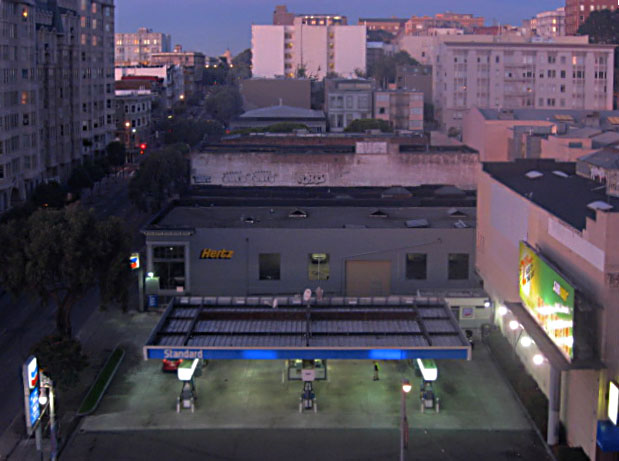In her ongoing effort to let private developers build on every possible lot in San Francisco, Mayor London Breed is proposing to make it easier to turn “automotive uses”—that means gas stations and repair shops—into for-profit housing.
The measure headed for the Land Use and Transportation Committee Monday/11 would remove the requirement that developers get a conditional-use permit—which gives the neighbors a chance to be heard—before an automotive use becomes housing.

On the surface, it seems to make some sense: The city needs new housing, space is rare, and as more and more vehicles become electric, and (we hope) fewer and fewer people drive, the city won’t need as many gas stations.
Fair enough.
But some legacy gas stations are also garages that fix cars, and those places provide good-paying blue-collar jobs—and the proposal doesn’t require that the new housing, built with a big developer benefit, either include onsite affordable units or be subject to rent control.
That has community groups like Calle 24 Latino Cultural District, United to Save the Mission, and Young Community developers pushing the supes to defeat the measure:
The core premise of the Mayor’s legislation is to principally permit residential developments on sites with existing Automotive Uses and to provide enhanced density on those eligible sites. As an overarching comment, any financial assistance conferred upon an eligible project sponsor—including but not limited to density bonuses and any other waivers of Planning Code requirements—should render the entire resulting project subject to rent control.
There’s another issue here: the definition of “automotive use” is so broad that it makes no distinction between a parking lot and a place where people work on fixing cars. Even electric cars will need maintenance and repair, and as gas stations shift into becoming charging stations for those vehicles, that function will remain:
Automotive service and repair jobs and other blue-collar jobs associated with “Automotive Uses” are essential to the livelihoods of families across San Francisco. Among other findings, the Conditional Use requirement set forth in Section 202.5 requires the Planning Commission to find that the elimination of these blue-collar jobs is “necessary and desirable.”
Let’s be honest: The old gas stations of the past are going to become obsolete, and the city needs far fewer than we have, and the committee will also consider legislation to make Electric Vehicle Charging Stations count at Automotive Uses. (On the other hand, while people still drive gas-powered vehicles, fewer stations mean less competition and higher fuel prices.)
Help us save local journalism!
Every tax-deductible donation helps us grow to cover the issues that mean the most to our community. Become a 48 Hills Hero and support the only daily progressive news source in the Bay Area.
But the community groups have a point: Every time the city gives a developer and handout (and removing CU is a handout, since it saves the developer money), the city ought to get some benefit.
And as space for blue-collar jobs has been increasingly destroyed in San Francisco, it’s worth considering the tradeoffs.
That hearing starts at 1:30pm.
The Rules Committee is finishing up with the fall City Charter amendments, including a measure to block city workers who are serious crooks from getting pension benefits and a requirement that developers who get special permission to build bigger and taller projects be subjected to rent control.
The committee will also consider a measure to set aside some extra property tax-revenue the city gets every year for a Student Success Fund for SFUSD. There are some folks in labor who don’t like the idea, since it could impact the city’s future budget, but it has six co-sponsors, so it’s probably headed for the fall ballot.
That meeting starts at 10am.




